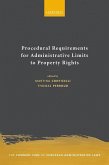The Limits of Human Rights
Herausgeber: Fassbender, Bardo; Traisbach, Knut
The Limits of Human Rights
Herausgeber: Fassbender, Bardo; Traisbach, Knut
- Gebundenes Buch
- Merkliste
- Auf die Merkliste
- Bewerten Bewerten
- Teilen
- Produkt teilen
- Produkterinnerung
- Produkterinnerung
Questioning the idea that the growth of the international human rights regime is limitless, this book examines the functional, systemic, and ideological boundaries of human rights law from a multidisciplinary perspective.
Andere Kunden interessierten sich auch für
![Freedom of Religion, Secularism, and Human Rights Freedom of Religion, Secularism, and Human Rights]() Freedom of Religion, Secularism, and Human Rights141,99 €
Freedom of Religion, Secularism, and Human Rights141,99 €![The Human Rights Covenants at 50 The Human Rights Covenants at 50]() The Human Rights Covenants at 50164,99 €
The Human Rights Covenants at 50164,99 €![The Limits of Competition Law The Limits of Competition Law]() Tony ProsserThe Limits of Competition Law192,99 €
Tony ProsserThe Limits of Competition Law192,99 €![In the Shadow of Korematsu In the Shadow of Korematsu]() Eric K YamamotoIn the Shadow of Korematsu75,99 €
Eric K YamamotoIn the Shadow of Korematsu75,99 €![Procedural Requirements for Administrative Limits to Property Rights Procedural Requirements for Administrative Limits to Property Rights]() Procedural Requirements for Administrative Limits to Property Rights166,99 €
Procedural Requirements for Administrative Limits to Property Rights166,99 €![The Limits and Legitimacy of Referendums The Limits and Legitimacy of Referendums]() The Limits and Legitimacy of Referendums142,99 €
The Limits and Legitimacy of Referendums142,99 €![The Limits of the Legal Complex The Limits of the Legal Complex]() The Limits of the Legal Complex141,99 €
The Limits of the Legal Complex141,99 €-
-
-
Questioning the idea that the growth of the international human rights regime is limitless, this book examines the functional, systemic, and ideological boundaries of human rights law from a multidisciplinary perspective.
Hinweis: Dieser Artikel kann nur an eine deutsche Lieferadresse ausgeliefert werden.
Hinweis: Dieser Artikel kann nur an eine deutsche Lieferadresse ausgeliefert werden.
Produktdetails
- Produktdetails
- Verlag: Oxford University Press
- Seitenzahl: 410
- Erscheinungstermin: 21. Januar 2020
- Englisch
- Abmessung: 236mm x 157mm x 33mm
- Gewicht: 748g
- ISBN-13: 9780198824756
- ISBN-10: 0198824750
- Artikelnr.: 58121221
- Herstellerkennzeichnung
- Libri GmbH
- Europaallee 1
- 36244 Bad Hersfeld
- 06621 890
- Verlag: Oxford University Press
- Seitenzahl: 410
- Erscheinungstermin: 21. Januar 2020
- Englisch
- Abmessung: 236mm x 157mm x 33mm
- Gewicht: 748g
- ISBN-13: 9780198824756
- ISBN-10: 0198824750
- Artikelnr.: 58121221
- Herstellerkennzeichnung
- Libri GmbH
- Europaallee 1
- 36244 Bad Hersfeld
- 06621 890
Bardo Fassbender is Professor of International Law, European Law and Public Law at the University of St. Gallen. He studied law, history and political science at the University of Bonn (Germany) and holds an LL.M from Yale Law School and a Doctor iuris from the Humboldt University in Berlin, where he also completed his Habilitation and became Privatdozent for the disciplines of public law, international law, European law and constitutional history. He was a Ford Foundation Senior Fellow in Public International Law at Yale University and a Jean Monnet Fellow at the European University Institute in Florence. Before joining the University of St. Gallen in 2013, he held the chair in international law and human rights law at the Bundeswehr University in Munich. His principal fields of research are public international law, United Nations law, comparative constitutional law and theory, and the history of international and constitutional law. Knut Traisbach is Associate Professor of International Law (Adjunct) at the University of Barcelona and tutor for three international postgraduate programmes in International Affairs and Diplomacy organized by UNITAR and UOC. He also teaches human rights at ESADE Law School in Barcelona. He holds degrees from Humboldt University Berlin, the European University Institute and was a visiting researcher at Yale Law School. He has held positions as lecturer, programme director, researcher and course convenor in the areas of international law, human rights and international relations at various higher education and research institutions in Berlin, Florence, Venice and Barcelona. His main research interests include meaningful interdisciplinary and critical approaches to international law, human rights and international relations theory.
* Introduction: A Ride on the Human Rights Bus
* Prologue: Limits and their Varieties
* Part 1. Limits of Ideas, Limits of Communities: Paradigms and Biases
* 1: Lynn Hunt: Humanity and the Claim to Self-Evidence
* 2: Bardo Fassbender: The Self-Evidence of Human Rights: Origins and
Limits of an Idea
* 3: Kate Nash: Human Rights, Global Justice, and the Limits of Law
* 4: Mark Goodale: Human Rights beyond the Double Bind of Sovereignty:
A Response to Kate Nash
* 5: David Dyzenhaus: Emergencies and Human Rights: A Hobbesian
Analysis
* 6: Conor Gearty: Reason, Faith, and Feelings: A Response to David
Dyzenhaus
* Part 2. Limits of Functions, Limits of Uses: Actors and Practices
* 7: Christian Reus-Smit: Being a Realist about Human Rights
* 8: Basak Çali: Political Limits of International Human Rights: A
Response (or a Rejoinder) to Christian Reus-Smit
* 9: Jan Klabbers: Human Rights Bodies and the Structure of
Institutional Obligation
* 10: Rosa Freedman and Ruth Houghton: Dissecting the Institution: A
Response to Jan Klabbers
* 11: Aryeh Neier: Differentiating Fundamental Rights and Economic
Goals
* 12: Jeremy Perelman: Advocating for Social and Economic
Rights-Critical Perspectives: A Response to Aryeh Neier
* Part 3. Limits of Scope, Limits of Recognition: The Case of Women's
Rights
* 13: Hilary Charlesworth and Christine Chinkin: Between the Margins
and the Mainstream: The Case of Women's Rights
* 14: Bai Guimei: Women's Rights are Human Rights: A Response to Hilary
Charlesworth and Christine Chinkin from a Chinese Perspective
* 15: Martha C. Nussbaum: Women's Progress and Women's Human Rights
* 16: Fareda Banda: The Limits of Law: A Response to Martha C Nussbaum
* Part 4. Limits of Pragmatism, Limits of Compromise: The Case of Armed
Conflict
* 17: Frédéric Mégret: The Limits of the Laws of War
* 18: Knut Traisbach: The Banality of Humanity (as an Absolute): A
Response to Frédéric Mégret
* 19: Andrew Clapham: The Limits of Human Rights in Times of Armed
Conflict and Other Situations of Armed Violence
* 20: Yuval Shany: The End of the War/Peace Limit on the Application of
International Human Rights Law: A Response to Andrew Clapham
* Part 5. Limits of Prospects, Limits of Means: An Outlook
* 21: Mireille Delmas-Marty: The Limits of Human Rights in a Moving
World-Elements of a Dynamic Approach
* 22: Marie-Bénédicte Dembour: Where are the Limits of Human Rights?
Four Schools, four Complementary Visions: A Response to Mireille
Delmas-Marty
* 23: Douglas A. Johnson and Kathryn Sikkink: Strategizing for Human
Rights: From Ideals to Practice
* 24: Micheline Ishay: Historical Strategies for Human Rights: A
Response to Kathryn Sikkink and Douglas Johnson
* Prologue: Limits and their Varieties
* Part 1. Limits of Ideas, Limits of Communities: Paradigms and Biases
* 1: Lynn Hunt: Humanity and the Claim to Self-Evidence
* 2: Bardo Fassbender: The Self-Evidence of Human Rights: Origins and
Limits of an Idea
* 3: Kate Nash: Human Rights, Global Justice, and the Limits of Law
* 4: Mark Goodale: Human Rights beyond the Double Bind of Sovereignty:
A Response to Kate Nash
* 5: David Dyzenhaus: Emergencies and Human Rights: A Hobbesian
Analysis
* 6: Conor Gearty: Reason, Faith, and Feelings: A Response to David
Dyzenhaus
* Part 2. Limits of Functions, Limits of Uses: Actors and Practices
* 7: Christian Reus-Smit: Being a Realist about Human Rights
* 8: Basak Çali: Political Limits of International Human Rights: A
Response (or a Rejoinder) to Christian Reus-Smit
* 9: Jan Klabbers: Human Rights Bodies and the Structure of
Institutional Obligation
* 10: Rosa Freedman and Ruth Houghton: Dissecting the Institution: A
Response to Jan Klabbers
* 11: Aryeh Neier: Differentiating Fundamental Rights and Economic
Goals
* 12: Jeremy Perelman: Advocating for Social and Economic
Rights-Critical Perspectives: A Response to Aryeh Neier
* Part 3. Limits of Scope, Limits of Recognition: The Case of Women's
Rights
* 13: Hilary Charlesworth and Christine Chinkin: Between the Margins
and the Mainstream: The Case of Women's Rights
* 14: Bai Guimei: Women's Rights are Human Rights: A Response to Hilary
Charlesworth and Christine Chinkin from a Chinese Perspective
* 15: Martha C. Nussbaum: Women's Progress and Women's Human Rights
* 16: Fareda Banda: The Limits of Law: A Response to Martha C Nussbaum
* Part 4. Limits of Pragmatism, Limits of Compromise: The Case of Armed
Conflict
* 17: Frédéric Mégret: The Limits of the Laws of War
* 18: Knut Traisbach: The Banality of Humanity (as an Absolute): A
Response to Frédéric Mégret
* 19: Andrew Clapham: The Limits of Human Rights in Times of Armed
Conflict and Other Situations of Armed Violence
* 20: Yuval Shany: The End of the War/Peace Limit on the Application of
International Human Rights Law: A Response to Andrew Clapham
* Part 5. Limits of Prospects, Limits of Means: An Outlook
* 21: Mireille Delmas-Marty: The Limits of Human Rights in a Moving
World-Elements of a Dynamic Approach
* 22: Marie-Bénédicte Dembour: Where are the Limits of Human Rights?
Four Schools, four Complementary Visions: A Response to Mireille
Delmas-Marty
* 23: Douglas A. Johnson and Kathryn Sikkink: Strategizing for Human
Rights: From Ideals to Practice
* 24: Micheline Ishay: Historical Strategies for Human Rights: A
Response to Kathryn Sikkink and Douglas Johnson
* Introduction: A Ride on the Human Rights Bus
* Prologue: Limits and their Varieties
* Part 1. Limits of Ideas, Limits of Communities: Paradigms and Biases
* 1: Lynn Hunt: Humanity and the Claim to Self-Evidence
* 2: Bardo Fassbender: The Self-Evidence of Human Rights: Origins and
Limits of an Idea
* 3: Kate Nash: Human Rights, Global Justice, and the Limits of Law
* 4: Mark Goodale: Human Rights beyond the Double Bind of Sovereignty:
A Response to Kate Nash
* 5: David Dyzenhaus: Emergencies and Human Rights: A Hobbesian
Analysis
* 6: Conor Gearty: Reason, Faith, and Feelings: A Response to David
Dyzenhaus
* Part 2. Limits of Functions, Limits of Uses: Actors and Practices
* 7: Christian Reus-Smit: Being a Realist about Human Rights
* 8: Basak Çali: Political Limits of International Human Rights: A
Response (or a Rejoinder) to Christian Reus-Smit
* 9: Jan Klabbers: Human Rights Bodies and the Structure of
Institutional Obligation
* 10: Rosa Freedman and Ruth Houghton: Dissecting the Institution: A
Response to Jan Klabbers
* 11: Aryeh Neier: Differentiating Fundamental Rights and Economic
Goals
* 12: Jeremy Perelman: Advocating for Social and Economic
Rights-Critical Perspectives: A Response to Aryeh Neier
* Part 3. Limits of Scope, Limits of Recognition: The Case of Women's
Rights
* 13: Hilary Charlesworth and Christine Chinkin: Between the Margins
and the Mainstream: The Case of Women's Rights
* 14: Bai Guimei: Women's Rights are Human Rights: A Response to Hilary
Charlesworth and Christine Chinkin from a Chinese Perspective
* 15: Martha C. Nussbaum: Women's Progress and Women's Human Rights
* 16: Fareda Banda: The Limits of Law: A Response to Martha C Nussbaum
* Part 4. Limits of Pragmatism, Limits of Compromise: The Case of Armed
Conflict
* 17: Frédéric Mégret: The Limits of the Laws of War
* 18: Knut Traisbach: The Banality of Humanity (as an Absolute): A
Response to Frédéric Mégret
* 19: Andrew Clapham: The Limits of Human Rights in Times of Armed
Conflict and Other Situations of Armed Violence
* 20: Yuval Shany: The End of the War/Peace Limit on the Application of
International Human Rights Law: A Response to Andrew Clapham
* Part 5. Limits of Prospects, Limits of Means: An Outlook
* 21: Mireille Delmas-Marty: The Limits of Human Rights in a Moving
World-Elements of a Dynamic Approach
* 22: Marie-Bénédicte Dembour: Where are the Limits of Human Rights?
Four Schools, four Complementary Visions: A Response to Mireille
Delmas-Marty
* 23: Douglas A. Johnson and Kathryn Sikkink: Strategizing for Human
Rights: From Ideals to Practice
* 24: Micheline Ishay: Historical Strategies for Human Rights: A
Response to Kathryn Sikkink and Douglas Johnson
* Prologue: Limits and their Varieties
* Part 1. Limits of Ideas, Limits of Communities: Paradigms and Biases
* 1: Lynn Hunt: Humanity and the Claim to Self-Evidence
* 2: Bardo Fassbender: The Self-Evidence of Human Rights: Origins and
Limits of an Idea
* 3: Kate Nash: Human Rights, Global Justice, and the Limits of Law
* 4: Mark Goodale: Human Rights beyond the Double Bind of Sovereignty:
A Response to Kate Nash
* 5: David Dyzenhaus: Emergencies and Human Rights: A Hobbesian
Analysis
* 6: Conor Gearty: Reason, Faith, and Feelings: A Response to David
Dyzenhaus
* Part 2. Limits of Functions, Limits of Uses: Actors and Practices
* 7: Christian Reus-Smit: Being a Realist about Human Rights
* 8: Basak Çali: Political Limits of International Human Rights: A
Response (or a Rejoinder) to Christian Reus-Smit
* 9: Jan Klabbers: Human Rights Bodies and the Structure of
Institutional Obligation
* 10: Rosa Freedman and Ruth Houghton: Dissecting the Institution: A
Response to Jan Klabbers
* 11: Aryeh Neier: Differentiating Fundamental Rights and Economic
Goals
* 12: Jeremy Perelman: Advocating for Social and Economic
Rights-Critical Perspectives: A Response to Aryeh Neier
* Part 3. Limits of Scope, Limits of Recognition: The Case of Women's
Rights
* 13: Hilary Charlesworth and Christine Chinkin: Between the Margins
and the Mainstream: The Case of Women's Rights
* 14: Bai Guimei: Women's Rights are Human Rights: A Response to Hilary
Charlesworth and Christine Chinkin from a Chinese Perspective
* 15: Martha C. Nussbaum: Women's Progress and Women's Human Rights
* 16: Fareda Banda: The Limits of Law: A Response to Martha C Nussbaum
* Part 4. Limits of Pragmatism, Limits of Compromise: The Case of Armed
Conflict
* 17: Frédéric Mégret: The Limits of the Laws of War
* 18: Knut Traisbach: The Banality of Humanity (as an Absolute): A
Response to Frédéric Mégret
* 19: Andrew Clapham: The Limits of Human Rights in Times of Armed
Conflict and Other Situations of Armed Violence
* 20: Yuval Shany: The End of the War/Peace Limit on the Application of
International Human Rights Law: A Response to Andrew Clapham
* Part 5. Limits of Prospects, Limits of Means: An Outlook
* 21: Mireille Delmas-Marty: The Limits of Human Rights in a Moving
World-Elements of a Dynamic Approach
* 22: Marie-Bénédicte Dembour: Where are the Limits of Human Rights?
Four Schools, four Complementary Visions: A Response to Mireille
Delmas-Marty
* 23: Douglas A. Johnson and Kathryn Sikkink: Strategizing for Human
Rights: From Ideals to Practice
* 24: Micheline Ishay: Historical Strategies for Human Rights: A
Response to Kathryn Sikkink and Douglas Johnson








